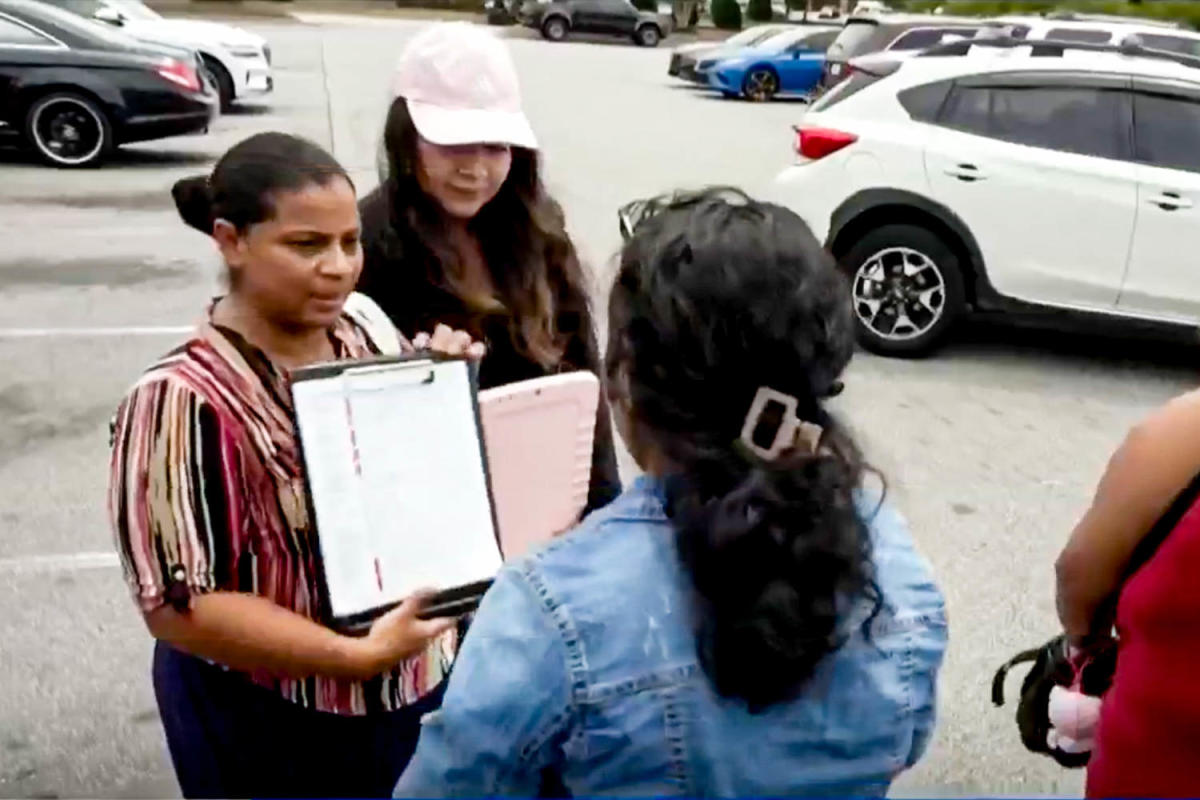WAKE COUNTY, North Carolina — When Josahandy Avila thinks about the 2024 presidential election, the word “excitement” doesn’t come to mind.
As a first-generation Mexican American, her family is directly affected by state and federal immigration laws, and she worries about reproductive rights. But she’s still undecided on the presidential front — she’s leaning toward president Joe Biden but may be open to a third party ticket.
“I think they just want to give us what we want to hear,” she said of both Biden and Donald Trump“Neither of them is talking about issues that are very important to us. And it’s not just about immigration, it’s about education, health care — other issues like the economy.”
As Democrats try to bring the pivotal state of North Carolina back into the race for president for the first time since 2008, Latinos like Avila will be a key factor — but an increasingly difficult one.
The state’s Latino population has grown 40% over the past decade — the largest increase of any other racial or ethnic group in the state. And Latinos make up more than 1.1 million residents — 290,000 of whom are registered voters — in a state that Trump won by fewer than 75,000 votes in 2020.
But getting them to the polls this year may be harder than ever. Latino voter turnout actually fell in 2022 after increasing in the past two midterms. And turnout was even worse in the most recent primaries, with less than 8% of Hispanic voters turning out, compared to nearly 30% of non-Hispanic voters.
Nikki Marín Baena is the co-founder and co-director of Siembra NC, a grassroots political organization based in Greensboro focused on progressive issues and candidates. The organization has registered 3,200 Latino voters this year, with a goal of 5,000 before the election.
She estimates that the campaigners on her team spoke to nearly 10,000 voters to reach that number, by reaching out to flea markets — popularly known as “mercado de pulgas” — and shopping malls, gyms and supermarkets in five counties with large Latino populations.
“One of the things I say to the staff over and over again is that this election is not between Biden and Trump. This election is between Biden and Trump and the bank,” Marín Baena said. “And the bank seems like a very good option for many people right now.”
Her organization is also focused on hyperlocal issues that she believes impact people outside of election cycles, like labor rights and wage theft. One reason: She believes Latino voters in the state are less engaged in politics at the federal level this year.
“In 2020, the last presidential election, I think it was much clearer to people, what we were dealing with and what the choice was and how the two candidates were different. I think all of that felt sharper,” Marín Baena said. “I think people have forgotten a little bit about 2020 and I think the constant news that we’re getting has made everything blur together in a way that people don’t seem to be able to see as much difference between the two candidates.”
For 20-year-old Wake County resident Gema, who did not want to give her last name, the key issues in this election are reproductive rights, the rise in complaints leading to book bans in the state, and a potential ban on TikTok in the U.S.
She’s also not sure if she’s registered to vote.
“Honestly, I don’t even know who to vote for because it’s like no matter which side you’re on, there’s always some uncertainty going on,” Gema said.
As one of the state’s estimated 7 million Latino residents between the ages of 18 and 24, she’s not alone. A recent national survey by the Brookings Institution found that while young Latino voters are more likely to support Democratic candidates, 37% of those under 30 say Biden and Democrats “don’t care about the Latino community.”
It’s a discontent that Republicans in the state are hoping to capitalize on. While only 2% of North Carolina Republicans identified as Hispanic in 2023, National Hispanic Outreach Director Sandy Moyer said the party’s message on economic issues and inflation resonates with the community, particularly when it comes to the cost of gas, groceries and homeownership.
“What are people doing now? They’re renting homes. Well, a lot of these Hispanics, what’s the American dream? Owning a home,” Moyer said. “These are the things we talk to them about, and they say, ‘No, we have a big problem.’ The rental market is actually booming, but the housing market is not.”
NBC News also reached out to state Democratic Party leaders, who said they are investing in the state’s Latino community now more than ever before. They added, in part:
“While Trump has overseen a 47% increase in Latino unemployment and pushed to increase our health care costs, President Biden has delivered for our Latino communities by creating more than 400,000 good-paying jobs in our state and expanding access to affordable health care for more than 600,000 North Carolinians.”
They also pointed to a seven-figure campaign ad specifically targeting Latinos watching the Copa America tournament. They said that ad will air in several states with varying degrees of success, including North Carolina, which will host a tournament match in Charlotte on July 10.
Meanwhile, in Wake County, Gema’s mother, Zaza, who also declined to give her last name, said she worries that both candidates are too old, but she still plans to vote this year. She feels it’s her responsibility as an American citizen.
“Because it will make a difference,” she said in Spanish. “Poquito, pero una diferencia” — “a little, but a difference.”
This article was originally published on NBCNews.com
